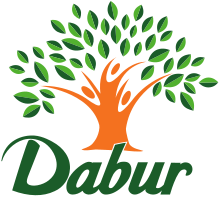Dabur
Indian consumer goods company From Wikipedia, the free encyclopedia
Dabur Ltd is an Indian multinational consumer goods company, founded by S. K. Burman and headquartered in Ghaziabad.[4] It manufactures Ayurvedic products[5] and fast-moving consumer goods.[6] Dabur derives around 60% of its revenue from the consumer care business, 11% from the food business and remaining from the international business unit.[7]
 | |
| Company type | Public |
|---|---|
| ISIN | INE016A01026 |
| Industry | Consumer goods |
| Founded | 1884 in Kolkata, India |
| Founder | S. K. Burman |
| Headquarters | , India |
Area served | Worldwide |
Key people |
|
| Products | |
| Revenue | ₹12,886 crore (US$1.5 billion) (FY24) |
| ₹2,359 crore (US$280 million) (FY24) | |
| ₹1,811 crore (US$210 million) (FY24) | |
| Total assets | ₹15,123 crore (US$1.8 billion) (FY24)[1] |
| Total equity | ₹10,303 crore (US$1.2 billion) (FY24) |
| Owner | Burman family (66.24%)[2] |
Number of employees | 7,740 (March 2020)[1] |
| Subsidiaries |
|
| Website | www |
| Footnotes / references [3] | |
History
Summarize
Perspective
Dabur was founded in Kolkata by Ayurvedic practitioner S. K. Burman in 1884. In the mid-1880s, he formulated Ayurvedic medicines for diseases like cholera, constipation and malaria.[8] As a qualified physician, he went on to sell his medicines in Bengal on a bicycle. His patients started referring him and his medicines as "Dabur", a portmanteau of the words daktar (doctor) and Burman.[9] He later went on to mass-produce his Ayurvedic formulations.
C.L. Burman, set up Dabur's first R&D unit. Later, his grandson, G.C Burman was gherao-ed by his own workers during a labor unrest in Kolkata. Due to the unpleasant situation, G.C Burman decided to move the factory to Delhi, where his brothers later relocated. In Delhi, the business thrived and the company soon became headquartered there. In the words of business historian Sonu Bhasin "Calcutta's loss was Delhi's gain."[9]
In 1997, Dabur set up a wholly-owned consumer goods subsidiary called Dabur Foods under which it launched its fruit juice brand called Real.[10][11]
In 1998, Dabur separated ownership from management, when they handed over the management of the company to professionals.[8]
Dabur demerged its pharma business in 2003 and hived it off into a separate company, Dabur Pharma.[12] German company Fresenius bought a 73% stake in Dabur Pharma for ₹872 crore (US$200.44 million) in 2008.[13]
In 2005, Dabur acquired three Balsara group companies, gaining control of brands such as Babool, Promise, Meswak, Odonil, Odomos, Odopic, and Sani Fresh.[14]
In 2009, Dabur completed the acquisition of a majority stake in female skincare products company Fem Care Pharma for ₹270 crore (US$55.78 million) and later merged the company into itself.[15]
In 2022, Dabur acquired a 51% stake in the Indian spices company Badshah Masala for ₹588 crore.[16]
In November 2024, Dabur acquired a 51% stake in Sesa Care, an Indian haircare company for an enterprise value of ₹315-325 crore.[17]
Philanthropy
Dabur's Sustainable Development Society (Sundesh) is a non-profit organisation started by Burman that aims to carry out welfare activities in the spheres of health care, education and other socio-economic activities. Dabur drives its corporate social responsibility (CSR) initiatives through Sundesh.[18][19]
The 2015 Brand Trust Report puts Dabur at 19th place.[20]
Controversy
Summarize
Perspective
Former executive director Pradip Burman was on the list of black money account holders on 27 October 2014 when the government published the list. Dabur rejected the black money charge.[21]
In December 2020, a report by the Centre for Science and Environment showed that Dabur Honey, along with other major brands' products, was adulterated with sugar syrup.[22]
Hajmola or Hazmola (transl. Digestion, from hazma/hajma) is an ayurvedic digestive tablet sold as a treatment for dyspepsia by Dabur under that name since the 1950s. A counterfeit of the product was trademarked by "Hilal Foods (Pvt.) Limited" (estb. 1986),[23] a Karachi based company in Pakistan, which had been selling it since at least the 1980s. When Dabur began operating in Pakistan, Hilal filed an intellectual property infringement suit against Dabur which was ultimately settled by the Sindh High Court allowing both Hilal and Dabur to use the Hajmola trademark.[24]
See also
- Dabur Research Foundation
- Chyawanprash
- Shilajit
References
External links
Wikiwand - on
Seamless Wikipedia browsing. On steroids.
